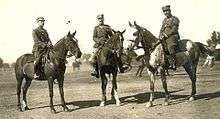Georgios Stanotas
Georgios Stanotas (Greek: Γεώργιος Στανωτάς, January 1, 1888 – 1965) was a Greek cavalry officer who rose to the rank of Lieutenant General.
Early life and career

He was born in the village of Kastanitsa, in the prefecture of Arcadia in the Peloponnese. He left his village early and went to Athens, where, in 1909, he joined the Hellenic Army as a simple cavalry trooper. He was an excellent rider, intelligent and bold, and soon he was promoted to non-commissioned officer. As such he participated in the First and Second Balkan Wars in 1912-1913, where he went up the ranks quickly due to his bravery.
In 1914, he entered and graduated from the NCO Academy and was promoted to second lieutenant of cavalry. In 1917 he was promoted to captain, but as an avowed royalist, so in 1917, after the ousting of King Constantine I during the National Schism, he was suspended from the army for 6 months.
In the Greco-Turkish War of 1919-1922, he demonstrated courage and extremely brave actions and initiative, so he received medals and decorations and became well known. He was promoted to major in 1923. Although in the military, in 1924 he enrolled into Athens University in the Pharmaceutics department. In 1927 he was promoted to lieutenant colonel and was appointed as Cavalry School Commander, while in 1929 he took command of the 3rd Cavalry Regiment in Larissa. In the following year, he was promoted to colonel and in 1933 he took command of the Cavalry Brigade. He was promoted to major general in 1938 and was appointed as CO of the Cavalry Division in Thessaloniki in 1939.
Second World War and after
In the Greco-Italian War of 1940, the Cavalry Division achieved the first great victory in the Battle of Pindus, being instrumental in the defeat of the elite Italian Julia Alpine Division. In the spring of 1941, Stanotas with the Cavalry Division fought against the invading Germans in West Macedonia, next to the rest of the Allied Forces. His combat achievements gave him a great reputation among his colleagues.
In 1943, he escaped from occupied Greece and through Turkey and Lebanon, he arrived in Cairo, where he joined the Greek Armed Forces in exile. There he was appointed as Inspector General of the Army. He retired in January 1945, after the liberation of Greece.
In 1947, when Greece was in the middle of the Greek Civil War, he was recalled to duty and was appointed as Commanding General of the Peloponnese. His experience allowed him to organize successful sweep operations and to destroy the main strongholds of the Communist led Democratic Army of Greece there. He finally retired in 1948 and received the honorary rank of lieutenant general.
Personal life
He was married to Aristea Toliopoulou and had a son Stamatios and a daughter Maria. After his retirement, he played pioneering role in the plastics industry in Greece. He died in 1965.
Sources
- (in Greek) Notaridis, Christos "ΕΝΑΣ ΠΙΣΤΟΣ ΚΑΙ ΦΙΛΟΤΙΜΟΣ ΣΤΡΑΤΙΩΤΗΣ" (One Loyal and Zealous Soldier), Biography of General Stanotas, ISBN 978-960-522-335-9, PELASGOS Publ. Athens 2013, http://www.e-shop.gr/show_bks.phtml?id=BKS.0458152
- (in Greek) Papagos, Alexandros "The Battle of Greece 1940–1941" Athens 1949: J.M. Scazikis “Alpha”, editions. ASIN B0007J4DRU.
- (in Greek) Hellenic Army History Directorate, Concise History of Greek-Italian and Greek-German War 1940-1941, Athens 1985.
- (in Greek) Hellenic Army Publications Division, Selected Military History Articles, 1981.
- (in Greek) Papyros-Larousse-Britannica Encyclopedia, Greek version, volume 55.
- (in Greek) Pantelis Karykas, The Greek Cavalry stops the Italian Blitzkrieg, article published in the War and History magazine, April 2006.
- (in Greek) Crushing "Julia", article published in the Military History magazine, October 2004.
- (in Greek) Konstantinos Papadimitriou, The battle of lake Kastoria, article published in the Military History magazine, July 2008.
- (in Greek) Military record file of General Stanotas, archived in the Greek Military Archives Service (YSA).